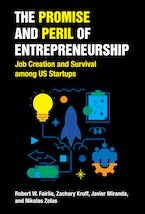Robert Fairlie
I am a Professor of Public Policy and Economics at UCLA, and a member of the National Bureau of Economic Research (NBER). I study a wide range of topics including entrepreneurship, education, labor, racial, gender and caste inequality, information technology, immigration, health, and development. I strive for my research to have a broad impact by providing rigorous, unbiased and objective evidence on questions that are important for society and often involve highly-charged policy debates. My methodological focus is on conducting randomized control field experiments, employing advanced econometric techniques and identification strategies, and working with and building large administrative datasets. Publications from my research have appeared in leading journals in economics, policy, management, science, and medicine.
I received a Ph.D. and M.A. from Northwestern University and B.A. with honors from Stanford University. I have held visiting positions at Stanford University, Yale University, UC Berkeley, and Australian National University. I have received funding for my research from the National Science Foundation, National Academies and Russell Sage Foundation as well as numerous government agencies and foundations, and have testified in front of the U.S. Senate, U.S. House of Representatives, U.S. Department of Treasury, and the California State Assembly. Recent awards and honors include a joint resolution from the California State Assembly, Choice Academic Title award, and the Bradford-Osborne research award in both 2020 and 2021. I am regularly interviewed by the media to comment on economic, education, entrepreneurship, inequality and policy issues.

My new book on entrepreneurship, job creation and survival just came out at MIT Press.
For more information on my research, teaching, and policy work, please visit: https://rfairlie.sites.luskin.ucla.edu/
